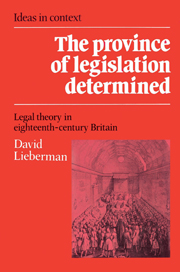Book contents
- Frontmatter
- Contents
- Preface
- Abbreviations
- Introduction
- I Blackstone and the Commentaries
- II The judiciary
- 3 Equity, principle and precedent
- 4 Legal principles and law reform
- 5 Mansfield and the commercial code
- 6 Common Law, principle and precedent
- 7 Kames, legal history and law reform
- 8 Kames and the principles of equity
- III Parliamentary statute
- IV Bentham
- Conclusion: The province of legislation determined
- Bibliography
- Index
6 - Common Law, principle and precedent
Published online by Cambridge University Press: 10 October 2009
- Frontmatter
- Contents
- Preface
- Abbreviations
- Introduction
- I Blackstone and the Commentaries
- II The judiciary
- 3 Equity, principle and precedent
- 4 Legal principles and law reform
- 5 Mansfield and the commercial code
- 6 Common Law, principle and precedent
- 7 Kames, legal history and law reform
- 8 Kames and the principles of equity
- III Parliamentary statute
- IV Bentham
- Conclusion: The province of legislation determined
- Bibliography
- Index
Summary
The success of Mansfield's court in refining and settling England's commercial law provided a most forceful vindication of the common law's continued capacity to develop legal remedies in response to new social needs. English legal theory, as authoritatively elaborated by Hale, explained how the incremental growth and steady process of correction in the methods of common law had produced in England an unmatched legal fabric, one in Blackstone's formula “now fraught with the accumulated wisdom of ages.” Classical doctrines of equity further revealed the discretion judges enjoyed to operate general rules of law in such a fashion that justice always occurred in each particular case before the court. Yet, in its extent and speed of accomplishment Mansfield's judicial achievement went beyond the expectations raised by these established orthodoxies. Through a masterful and programmatic utilization of the technical resources of the common law system, a “period of thirty years” had proved sufficient for the Chief Justice to consolidate an entire “system of mercantile jurisprudence.” “His decisions” were not of value “merely as individual precedents” – considered “collectively,” they were found “to form a complete code of jurisprudence.”
“The period during which Lord Mansfield presided in the Court of King's Bench,” William David Evans explained, “will ever be regarded as an important era in the annals of English jurisprudence.” The commercial code was not the only branch of law where the accomplishments of Mansfield's court seemed to mark a new era.
- Type
- Chapter
- Information
- The Province of Legislation DeterminedLegal Theory in Eighteenth-Century Britain, pp. 122 - 143Publisher: Cambridge University PressPrint publication year: 1989

